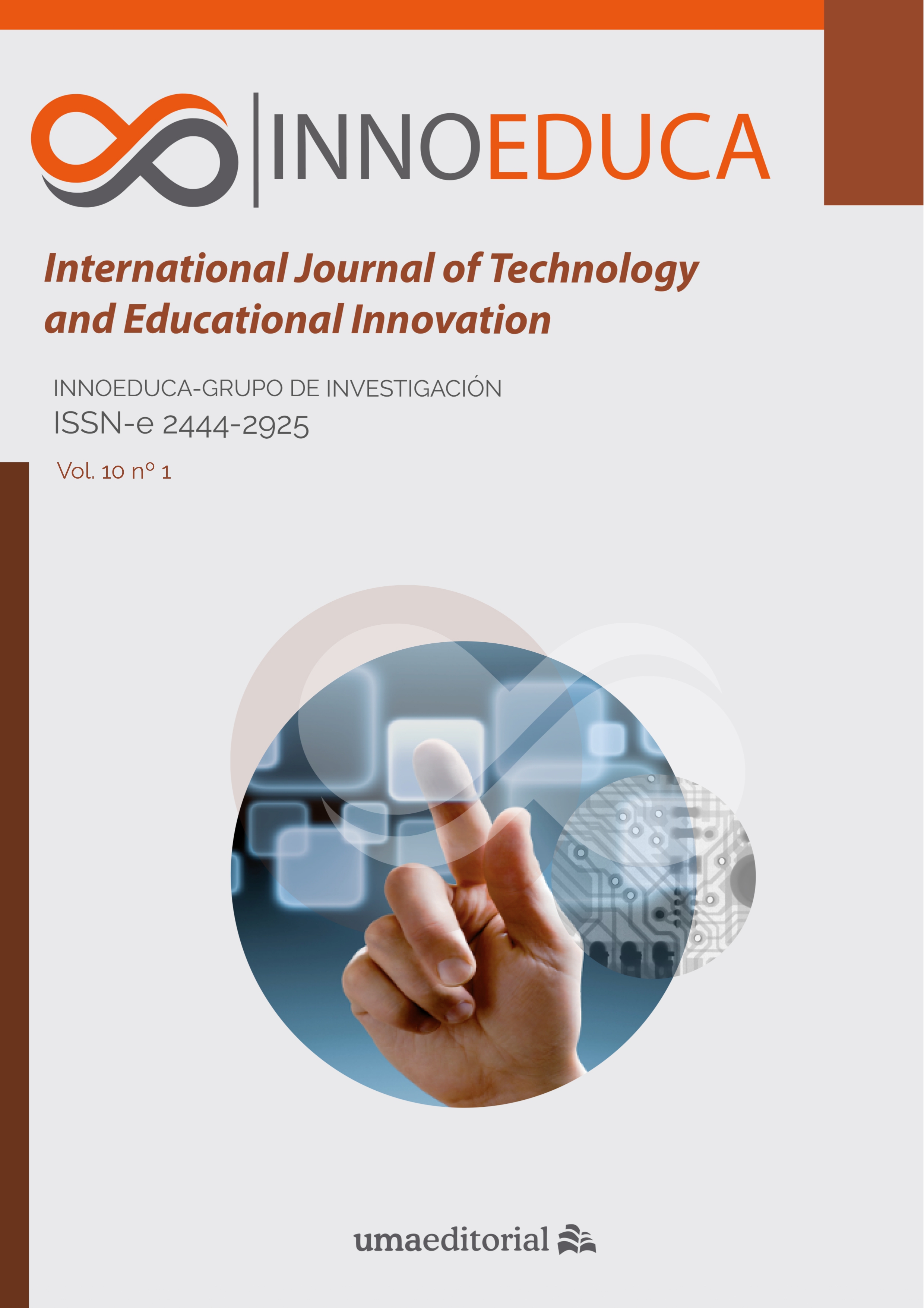El uso de libros electrónicos para mejorar el rendimiento académico de los estudiantes en la asignatura de Física: Implicaciones para la orientación
DOI:
https://doi.org/10.24310/ijtei.101.2024.15977Palabras clave:
Logro, Física, Estudiantes de tercer grado, Recursos TICResumen
La utilización de los recursos TIC tiene el potencial de mejorar la enseñanza y el aprendizaje, según la literatura. Para determinar la posible influencia de los libros electrónicos en el rendimiento de los estudiantes en física, no se ha realizado ninguna investigación empírica en Nigeria. De ahí la necesidad de este estudio. Utilizando un diseño de investigación simple de medidas repetidas, este estudio fue impulsado por una metodología de investigación cuantitativa. El estudio incluyó a 58 estudiantes de física de secundaria superior dos (2) que fueron seleccionados al azar de escuelas secundarias en la zona educativa de Nsukka. Para recopilar los datos se utilizó el Physics Achievement Test (PAT), que ha sido probado y validado de cara y contenido. La confiabilidad de consistencia interna para los componentes PAT fue .76. Se utilizó el análisis de varianza de medidas repetidas para analizar los datos recopilados. Se descubrió que el acceso de los alumnos a los libros electrónicos tuvo un impacto significativo (p < .05) en su desempeño en Física. Este hallazgo de investigación tiene implicaciones para el asesoramiento en el sentido de que los maestros y sus escuelas deben recibir orientación educativa y asesoramiento por parte del bibliotecario-consejero sobre las implicaciones legales y éticas del uso de recursos de TIC como libros electrónicos para impartir instrucciones de física en las escuelas.
Descargas
Métricas
Citas
Almekhlafi, A. G. (2021). The effect of E-books on Preservice student teachers’ achievement and perceptions in the United Arab Emirates. Education and Information Technologies, 26(1), 1001–1021. https://doi.org/10.1007/s10639-020-10298-x
Ardi, Z., Eseadi, C., Ade, A. H., Hidayat, H., & Guspriadi, Y. (2022). Students’ study pressures during the Covid-19 global pandemic: exploration of the effects of workload, self-expectation, grade worriness and despondency on college students in Indonesia. COUNS-EDU: The International Journal of Counseling and Education, 7(1), 32-47. https://doi.org/10.23916/0020220737710
Baskar A. (2017). E-resources and Its Uses in Library. Journal of Critical Reviews, 7(8), 3588–3592. https://doi.org/10.31838/jcr.07.08.569
Casselden, B., & Pears, R. (2020). Higher education student pathways to ebook usage and engagement, and understanding: highways and cul de sacs. Journal of Librarianship and Information Science, 52(2), 601-619. https://doi.org/10.1177/09610006198414
Chen, S., Jamiatul Husnaini, S., & Chen, J. J. (2020). Effects of games on students’ emotions of learning science and achievement in chemistry. International Journal of Science Education, 42(13), 2224–2245. https://doi.org/10.1080/09500693.2020.1817607
Cupido, A., & Suárez, B. (2022). Use of social networks by university students of the Faculty of Education (Universidad de Extremadura). Innoeduca. International Journal of Technology and Educational Innovation, 8 (2), 97-113. https://doi.org/10.24310/innoeduca.2022.v8i2.13719
Dudung, A., Hasanah, U., Salman, I., Priyanto, S & Ramdhan, T. (2022). Achievement of student graduates: The role of e-readiness, e-learning and e-book. International Journal of Data and Network Science, 6(2), 375-382. https://doi.org/10.5267/j.ijdns.2021.12.017
Dukper, K. B., Sakibu, B., & Arthur, B. (2019). Awareness and utilization of ICT resources by students of Tamale Technical University, Ghana. Library Philosophy and Practice(e-journal), 2078. http://digitalcommons.unl.edu/libphilprac/2078.
Eseadi, C. (2022). Effect of group mentoring on virtual library skills of secondary school students. Library Philosophy & Practice(e-journal), 6928. https://digitalcommons.unl.edu/libphilprac/6928
Eze, U. N., Sefotho, M. M., Onyishi, C. N., & Eseadi, C. (2021). Impact of COVID-19 Pandemic on Education in Nigeria: Implications for Policy and Practice of e-Learning. Library Philosophy and Practice(e-journal), 5651. https://digitalcommons.unl.edu/libphilprac/5651
Guillén, F.D., Colomo, E., Sánchez, E., & Pérez, R. (2020). Effects on the flipped classroom methodology through blackboard on the attitudes towards statistics of students of the primary education degree: A study with mixed ANOVA. Belo Horizonte, 13(3), 121-139. https://doi.org/10.35699/1983-3652.2020.25107
Green, S. G., Ferrante, C. J., & Heppard, K. A. (2016). Using open-book exams to enhance student learning, performance, and motivation. The Journal of Effective Teaching, 16(1), 19-35. https://files.eric.ed.gov/fulltext/EJ1092705.pdf
Jones, T., Prof, A., Brown, C., & Prof, A. (2011). Reading Engagement: a Comparison Between E-Books and Traditional Print Books in an Elementary Classroom. International Journal of Instruction, 4(2), 5-22. https://files.eric.ed.gov/fulltext/ED522678.pdf
Khoshimova, D. U. (2021). Improving speech skills using e-books. Интернет-пространство как вызов научному сообществу XXI века, (1), 133-137. https://cyberleninka.ru/article/n/improving-speech-skills-using-e-books/viewer
Korat, O., Levin, I., Atishkin, S., & Turgeman, M. (2014). E-book as facilitator of vocabulary acquisition: Support of adults, dynamic dictionary and static dictionary. Reading and Writing, 27(4), 613–629. https://doi.org/10.1007/s11145-013-9474-z
Korat, O., & Shamir, A. (2008). The educational electronic book as a tool for supporting children's emergent literacy in low versus middle SES groups. Computers & Education, 50(1), 110–124. https://doi.org/10.1016/j.compedu.2006.04.002
Kwangmuang, P., Jarutkamolpong, S., Sangboonraung, W., & Daungtod, S. (2021). The development of learning innovation to enhance higher order thinking skills for students in Thailand junior high schools. Heliyon, 7(6), e07309. https://doi.org/10.1016/j.heliyon.2021.e07309
Lakens, D. (2013). Calculating and reporting effect sizes to facilitate cumulative science: a practical primer for t-tests and ANOVAs. Frontiers in Psychology, 4, 863. https://doi.org/10.3389/fpsyg.2013.00863.
Lim, B. C. Y., Liu, L. W. L., & Choo, C. H. (2020). Investigating the Effects of Interactive E-Book towards Academic Achievement. Asian Journal of University Education, 16(3), 78–88. https://doi.org/10.24191/ajue.v16i3.10272
Marín-Díaz, V., Sampedro, B. E., & Vega Gea, E. (2022). Promoting learning through use of 360º videos. Innoeduca. International Journal of Technology and Educational Innovation, 8(2), 138-151. https://doi.org/10.24310/innoeduca.2022.v8i2.15120
Sari, S. Y., Rahim, F. R., Sundari, P. D., & Aulia, F. (2022, July). The importance of e-books in improving students’ skills in physics learning in the 21st century: a literature review. Journal of Physics: Conference Series, 2309, 012061. https://doi.org/10.1088/1742-6596/2309/1/012061
Shamir, A., Segal-Drori, O., & Goren, I. (2018). Educational electronic book activity supports language retention among children at risk for learning disabilities. Education and Information Technologies, 23(3), 1231–1252. https://doi.org/10.1007/s10639-017-9653-7
Shemy, N. S. (2020). The Impact of Digital Storytelling on Motivation and Achievement in Teaching Scientific Concepts for Pre-School Students. European Journal of Education Studies, 7(12), 801–820. https://doi.org/10.46827/ejes.v7i12.3627
Sun, L., & Pan, C.E. (2021). Effects of the Application of Information Technology to E-Book Learning on Learning Motivation and Effectiveness. Frontiers in Psychology, 12. https://doi.org/10.3389/fpsyg.2021.752303
Sung, Y.Y.C., & Chiu, D.K. (2022). E-book or print book: parents' current view in Hong Kong. Library Hi Tech, 40(5), 1289-1304. http://dx.doi.org/10.1108/LHT-09-2020-0230
Sung, H. Y., Hwang, G. J., Chen, C. Y., & Liu, W. X. (2022). A contextual learning model for developing interactive e-books to improve students’ performances of learning the Analects of Confucius. Interactive Learning Environments, 30(3), 470-483. http://dx.doi.org/10.1080/10494820.2019.1664595
Susilawati, E., Johari, A., Marzal, J., & Anggereini, E. (2022). Effects of Multimedia E-Books and Augmented Reality on Knowledge and Skills of Health Sciences Students: A Systematic Review. Journal of Client-Centered Nursing Care, 8(2), 99- https://doi.org/10. 10.32598/JCCNC.8.2.380.2
Ugwuanyi, C.S. (2022a). Evaluating the effectiveness of internet library resources on students’ achievement in Physics. Library Philosophy and Practice (e-journal), 6949. https://digitalcommons.unl.edu/libphilprac/6949
Ugwuanyi, C.S. (2022b). Enhancing children's achievement in basic science using library electronic books: a case of simple repeated evaluation. Library Philosophy and Practice (e-journal), 6573. https://digitalcommons.unl.edu/libphilprac/6573
Ugwuanyi, C. S., Ede, M. O., Onyishi, C. N., Ossai, O. V., Nwokenna, E. N., Obikwelu, L. C., Ikechukwu-Ilomuanya, A., Amoke, C. V., Okeke, A. O., Ene, C. U., Offordile, E. E., Ozoemena, L. C., & Nweke, M. L. (2020b). Effect of cognitive-behavioral therapy with music therapy in reducing physics test anxiety among students as measured by generalized test anxiety scale. Medicine, 99(17), e16406. https://doi.org/10.1097/MD.0000000000016406
Ugwuanyi, C. S., Okeke, C. I. O., & Agboeze, M. U. (2020). Management of Test Anxiety Among Pupils in Basic Science Using Music-Based Cognitive Behavior Therapy Intervention: Implication for Community Development. Journal of Rational - Emotive and Cognitive-Behavior Therapy, 39, 285-305. https://doi.org/10.1007/s10942-020-00371-2
Ugwuanyi, C. S., Okeke, C. I., & Okeke, C. C. (2021). Information and communication technology tool and children's achievement in Basic Science: Implication for Evaluation of Library and Information Resources. Library Philosophy and Practice(e-journal), 6097. https://digitalcommons.unl.edu/libphilprac/6097
Wijaya, T. T., Cao, Y., Weinhandl, R., & Tamur, M. (2022). A meta-analysis of the effects of e-books on students' mathematics achievement. Heliyon, 8(6), e09432. https://doi.org/10.1016/j.heliyon.2022.e09432
Wilujeng, I., & Lestari, D. P. (2022). Effect of interactive multimedia e-books on lower-secondary school students’ curiosity in a Science course. Education and Information Technologies, 27(7), 9619-9639. http://dx.doi.org/10.1007/s10639-022-11005-8
Zhao, J., Hwang, G. J., Chang, S. C., Yang, Q. F., & Nokkaew, A. (2021). Effects of gamified interactive e-books on students’ flipped learning performance, motivation, and meta-cognition tendency in a mathematics course. Educational Technology Research and Development, 69, 3255-3280. http://dx.doi.org/10.1007/s11423-021-10053-0
Descargas
Publicado
Cómo citar
Número
Sección
Licencia
Derechos de autor 2024 Innoeduca. International Journal of Technology and Educational Innovation

Esta obra está bajo una licencia internacional Creative Commons Atribución-NoComercial-SinDerivadas 4.0.
Todos los contenidos publicados por Innoeduca. International Journal of Technology and Educational Innovation están sujetos a la licencia de Creative Commons Reconocimiento-No comercial- SinObraDerivada 4.0 Internacional, cuyo texto completo se puede consultar en https://creativecommons.org/licenses/by-nc-nd/4.0/legalcode. Por lo tanto, la copia, distribución, comunicación pública, obras derivadas y el uso comercial de los contenidos están permitidas siempre que la fuente y el autor del texto se citen.
Es responsabilidad de los autores obtener los permisos necesarios de las imágenes que están sujetas a derechos de autor.

Este obra está bajo una licencia de Creative Commons Reconocimiento-NoComercial-SinObraDerivada 4.0 Internacional.









.jpg)


241.png)











